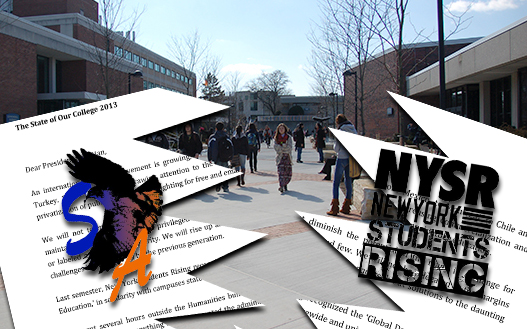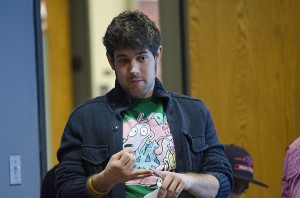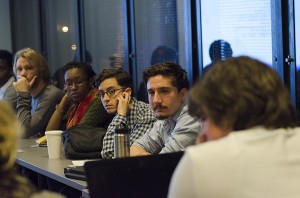
Despite being a point of contention during last week’s meeting, discussion regarding the recently distributed “State of Our College” address fell silent in the most recent meeting of SUNY New Paltz’s student senate.
While the address, which was sent to President Donald Christian earlier this month, was slated last week to be discussed at greater length on Wednesday, no mention of the address was brought up during any E-board or senate reports at the fifth senate meeting of the semester.
Various members of the senate had strong feelings regarding the addresses’ function, its necessity and the process by which the controversial document was distributed prior to Wednesday night.
The “State of Our College” dominated early discussion by the senate last week, after Student Association (SA) President Josh Simpson criticized the passion of those within SA. The address, which highlights concerns of students regarding the Women’s, Gender and Sexuality Studies program, gender-neutral housing, sustainability, the campus marijuana laws and other topics, highlighted a philosophical divide within those in senate.
Simpson said while the ideas and concerns about the letter were valued by him and the rest of SA, he was concerned with the way the letter was distributed. Simpson said that by bypassing the SA, the letter disenfranchised those within the student government.
“If there is a system in place, you need to use that system to its fullest advantage,” Simpson said.
Other senators, many of whom also belong to the groups that penned the letter, believe that the address empowered those involved with its creation, while also bringing issues and concerns of the community directly to thousands of people who viewed it.
Simpson said if the letter grew organically from students who felt that the SA was losing power, it was more of an issue with those sitting on senate than the system itself.
“I know that SA’s power was called into question,” Simpson said. “I don’t think the system is broken, but SA, like everything else, has room for improvement. At the end of the day, the students have all of the power and to go into a meeting, or be part of a senate with a feeling that it is all ineffective – it’s a waste of time. If that’s the energy you are putting into it, that’s the outcome you are going to get.”
Roberto LoBianco, a student senator involved in the process of creating the “State of Our College,” said the idea for an address was spearheaded by the community involvement stemming from the Park Point discussions last semester.
Through months of discussion, LoBianco said a group of 12 students — some of whom belonged to The Queer Action Coalition and Students for Sustainable Agriculture — noticed multiple instances of members of the community feeling that student voices were not being heard on important issues.
“I was part of this, but I don’t want to be the spokesperson for the letter,” LoBianco said. “I feel like there are so many student concerns that are not being addressed through SA and by the administration that the point needs to be made that this was really a group effort.”
Zachary Rousseas, another senator involved with the writing of the “State of Our College” said New York Students Rising set up sheets of paper outside of the Humanities Building last semester to gauge what students were most concerned about, and used the lists to move forward with the address this year.

However, Rousseas said he felt Simpson’s openining remarks last week undermined the work senators did in putting together the address.
“I thought it was an unfair generalization,” Rousseas said. “I thought it was unfair to group everyone together like that.”
Rousseas said he felt as if the address did not disenfranchise the SA or the senate, but rather offered a different route for students to fight for the changes they preceieved to be important.
“When we become senators we don’t revoke our student status, we still have the ability to, as students, write a letter to the president,” Rousseas said. “We are not renouncing one and doing the other — we are doing both.”
Both Simpson and LoBianco said the senate should use the topics brought up within the address as a jumping point for further discussion, however they realize potential road blocks.
Simpson said the SA’s function is to serve the students who elected them to office, but the government can only tackle issues if students and senators bring them to their attention.
“If outside conversations are being had about concerns SA is looking into, and those conversations aren’t brought to us, then I don’t know what we can do,” Simpson said. “We can be having the same exact conversations at the same time, but if we aren’t working together, then what can actually get done?”
While he sees the purpose of SA, LoBianco said he also believes that there are “infinite” ways to address issues that are deemed important to the campus, not just through the student government.
“You can tackle an issue or a set of issues from different perspectives and by using different tactics,” LoBianco said. “I think being accepting of that is the most important thing.”
LoBianco said he believed the current configuration of the SA has the potential to bring about the change highlighted in the letter; however, it remains to be seen if that potential can be made a reality.
“I think it’s a matter of everyone agreeing that’s where we want to go,” LoBianco said. “I’m not sure if we are at that point yet. Students come from different perspectives and I don’t know if there is an agreement on where that is where the SA wants to be.”
READ THE ENTIRE “STATE OF OUR COLLEGE” HERE:

